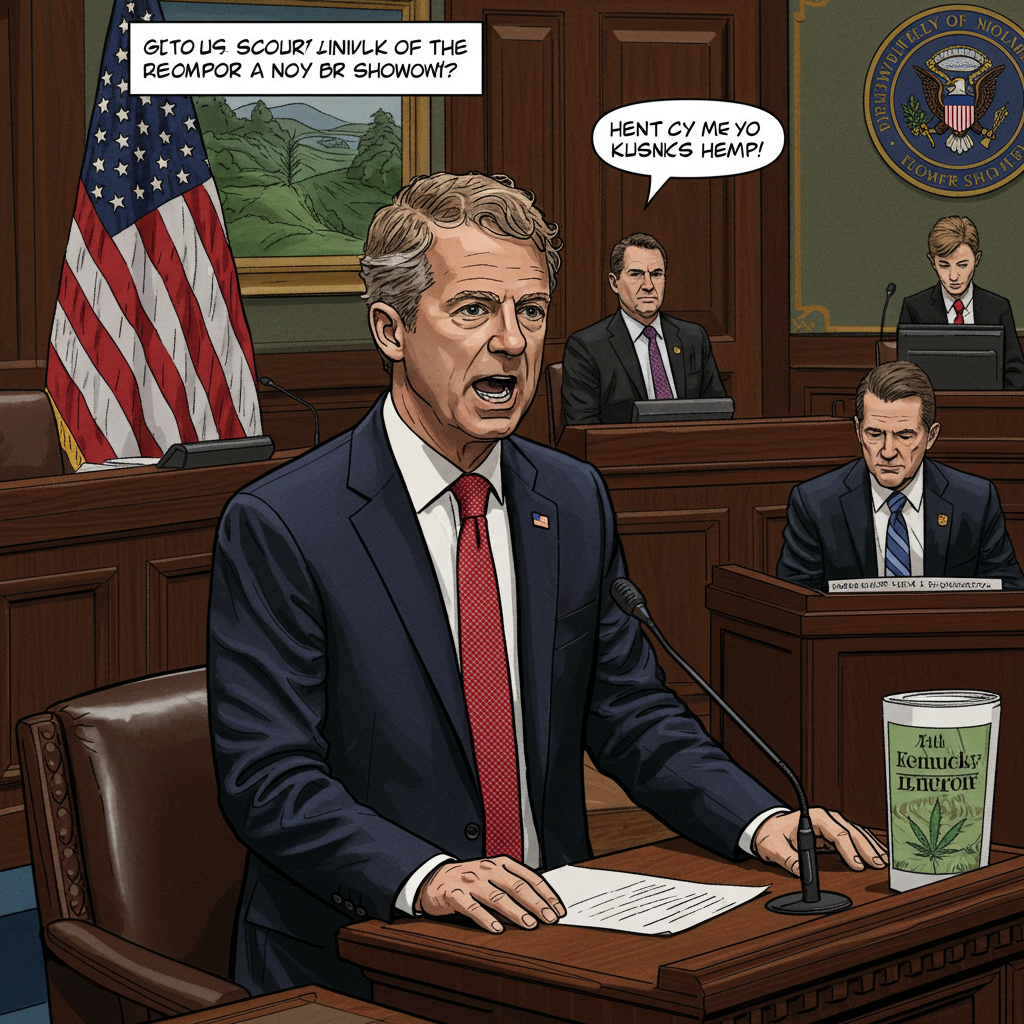Washington D.C. is once again gripped by legislative drama as a looming government shutdown demands urgent attention. However, Senator Rand Paul of Kentucky has introduced a significant roadblock: his insistence on a vote to protect Kentucky’s thriving hemp industry. This move, rooted in a broader fight over agricultural policy and federal regulation, is slowing down critical efforts to finalize a spending deal and reopen the government. The senator’s stand highlights the complex interplay between federal budgeting, state economic interests, and the evolving landscape of cannabis-related products.
The High-Stakes Government Shutdown Context
The nation faces a prolonged government shutdown, now in its 41st day. As lawmakers scramble to forge a consensus on a spending package, every procedural step becomes a potential flashpoint. Senate Republican leaders are under immense pressure to quickly pass legislation that can secure final approval from the House and the President. However, the requirement for unanimous consent in the Senate means any single senator can slow the process. Senator Paul has leveraged this powerful procedural tool to champion an amendment that, while seemingly unrelated to the budget, holds profound implications for his home state. This legislative maneuvering underscores the intricate dance of power and policy on Capitol Hill, where every vote can become a bargaining chip in larger political battles.
Senator Paul’s Stance on Hemp Legislation
Senator Rand Paul has unequivocally stated his demand for a vote on an amendment designed to strike specific language from the shutdown-ending spending deal. According to his spokesperson, Gabrielle Lipsky, this contested provision would “unfairly target Kentucky’s hemp industry.” Paul’s primary goal is to preserve the existing legal framework surrounding hemp, which has allowed Kentucky to become a national leader in hemp cultivation and processing. His advocacy reflects a deep commitment to defending the livelihoods of Kentucky farmers and the numerous manufacturing jobs supported by the state’s burgeoning hemp sector.
The Core of the Dispute: Intoxicating Hemp
At the heart of Senator Paul’s objection lies language within the spending bill that seeks to crack down on certain “intoxicating hemp products.” This phraseology points to a growing national debate about products derived from hemp, particularly those containing cannabinoids like Delta-8 THC, which can produce intoxicating effects while technically remaining below the federal limit for Delta-9 THC. The 2018 Farm Bill federally legalized hemp by defining it as cannabis with less than 0.3% Delta-9 THC. This legal distinction inadvertently created a loophole, allowing for the proliferation of products derived from hemp that nonetheless produce a “high.” Paul’s amendment aims to strike this new restrictive language, thereby maintaining the regulatory status quo and preventing a potentially devastating blow to an industry built on these nuanced legal definitions.
Political Battlegrounds: McConnell and Harris
Paul’s insistence on this specific Rand Paul hemp industry vote follows what has been described as a “bruising fight” with prominent appropriators, including his fellow Kentucky Republican, Senator Mitch McConnell, and Representative Andy Harris (R-Md.). Both McConnell and Harris, in their roles overseeing federal spending, have been instrumental in crafting the spending bill that includes the language targeting intoxicating hemp. This internal party struggle highlights differing views within the Republican caucus on how to regulate the rapidly evolving cannabis and hemp markets. For Senator Paul, this isn’t just about hemp; it’s about federal overreach and protecting a legitimate agricultural industry from what he perceives as unwarranted government interference. The clash underscores the complexities of bipartisan and intra-party negotiations when deeply held policy beliefs and economic interests converge.
The Impact on Kentucky’s Hemp Industry
Kentucky has emerged as a powerhouse in the national hemp market, thanks in large part to its fertile land and dedicated agricultural community. Farmers have invested heavily in cultivation, processing, and manufacturing infrastructure. The industry supports thousands of jobs, from the fields to laboratories and retail. If the proposed language targeting intoxicating hemp products were to pass, it could fundamentally alter the economic viability of many hemp businesses. These companies often rely on the sale of various cannabinoid products, including those derived from hemp’s legal loophole. Striking this provision, as Paul advocates, would safeguard these investments and ensure the continued growth of a vital economic sector in Kentucky. The senator’s office emphasized that these provisions are “unrelated to the budget and the government-reopening goal,” further strengthening his argument for their removal from a critical spending bill.
Legislative Hurdles and Procedural Realities
Senator Paul’s objection creates a significant procedural bottleneck. Without unanimous consent from all 100 senators, the spending bill cannot quickly advance. Instead, it would be subject to a series of time-consuming procedural votes, potentially extending the shutdown by “much of the week.” This delay tactic is a powerful tool in the Senate, forcing leaders to negotiate or risk further political fallout. While Paul is pushing for a simple-majority vote on his amendment, many GOP senators and aides believe it’s unlikely to garner enough support for adoption. This assessment reveals the difficult path Paul faces, even as he stands firm on his principles. The strategic use of procedural delays in the Senate illustrates how individual lawmakers can exert significant influence over the legislative agenda.
Broader Implications for Cannabis and Agriculture Policy
This Rand Paul hemp industry vote controversy extends beyond Kentucky’s borders, touching upon the broader federal approach to cannabis and agricultural policy. The debate over “intoxicating hemp” products reflects a national struggle to define and regulate the burgeoning market for cannabinoids. States have adopted varying regulations, leading to a patchwork of laws. This federal legislative effort could set a precedent for how the federal government intends to manage the gray areas created by the 2018 Farm Bill. The outcome of this dispute could influence future Farm Bills and the direction of agricultural policy reform, impacting farmers, processors, and consumers nationwide. It underscores the ongoing tension between economic opportunity, public health concerns, and consistent federal oversight in a rapidly evolving industry.
Frequently Asked Questions
What is the specific “hemp provision” Senator Rand Paul wants to strike?
Senator Rand Paul aims to remove specific language from the shutdown-ending spending deal that he believes would “unfairly target Kentucky’s hemp industry.” This language reportedly seeks to crack down on “intoxicating hemp products.” Paul’s amendment would effectively preserve the status quo established by the 2018 Farm Bill, which legalized hemp with less than 0.3% Delta-9 THC, and prevent new federal restrictions on products derived from it, like Delta-8 THC.
How does a senator’s objection affect the passage of a critical spending bill?
In the U.S. Senate, any single senator can object to requests for “unanimous consent,” which allows bills to bypass time-consuming procedural steps and move quickly to a vote. By objecting, Senator Paul forces the spending bill to undergo a full series of procedural votes, potentially delaying its passage by “much of the week.” This tactic grants him leverage to demand a vote on his desired amendment before allowing the larger bill to proceed, effectively slowing down efforts to end the government shutdown.
What are the economic stakes for Kentucky’s hemp industry if this provision passes?
Kentucky has become a significant player in the hemp market, with substantial investments in farming, processing, and manufacturing. If the proposed language cracking down on “intoxicating hemp products” passes, it could severely impact the profitability and viability of many businesses that rely on selling a range of cannabinoid products. Senator Paul argues that striking this provision is essential to “defend the livelihoods of Kentucky farmers, hemp processors, and manufacturing jobs” in the state, protecting a critical economic sector from new federal regulation.
Conclusion
Senator Rand Paul’s determined stance on the Rand Paul hemp industry vote casts a revealing light on the intricate legislative process and the powerful influence of individual senators. While focused on ending a 41-day government shutdown, the broader debate about federal oversight of the hemp industry and its economic impact on states like Kentucky continues. Paul’s insistence on protecting his state’s hemp farmers and processors highlights the economic stakes intertwined with seemingly minor legislative provisions. As the Senate navigates these procedural hurdles, the outcome of this political showdown will not only determine the swiftness of the government’s reopening but also send a clear message about the future regulation of hemp-derived products across the nation.



